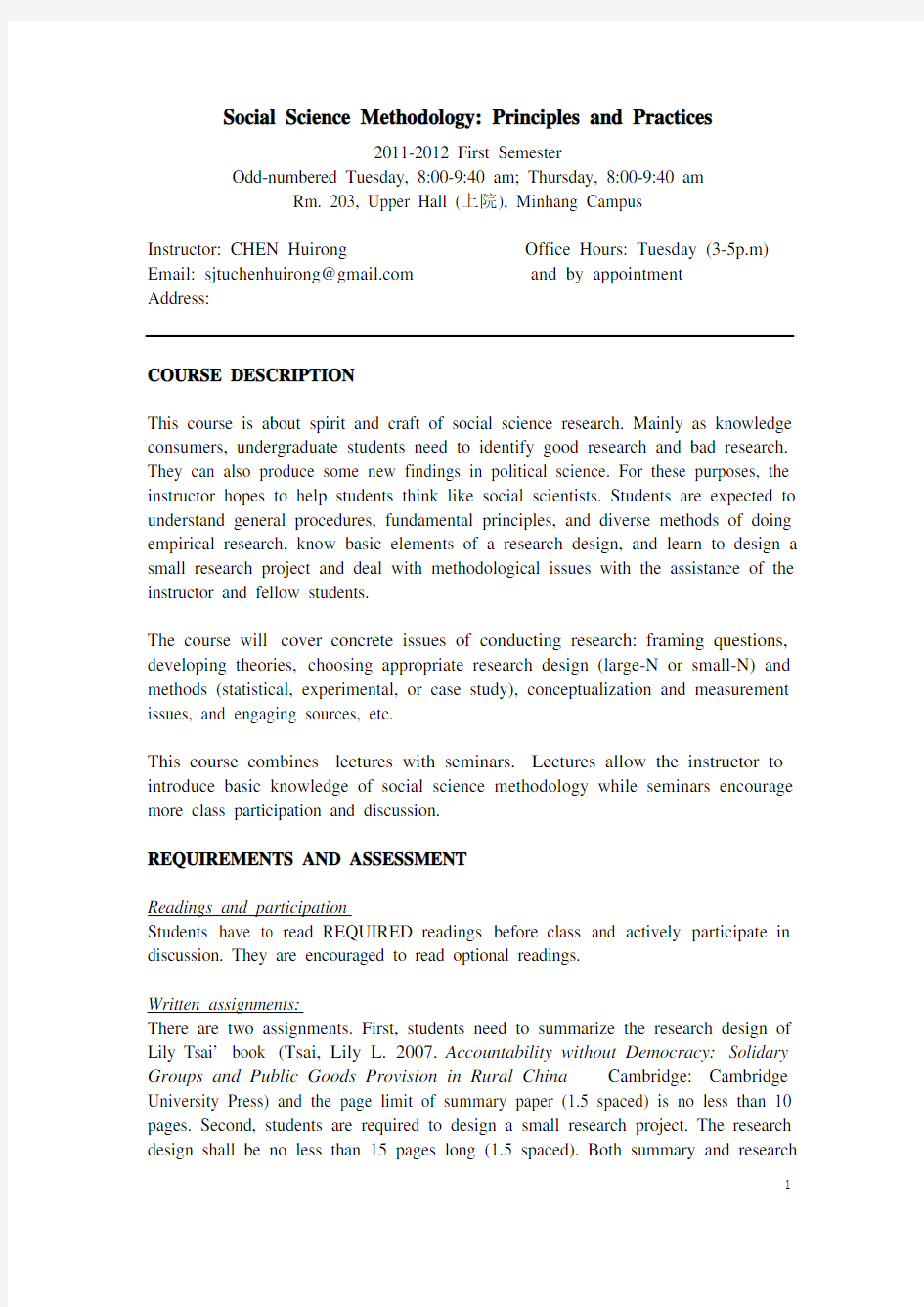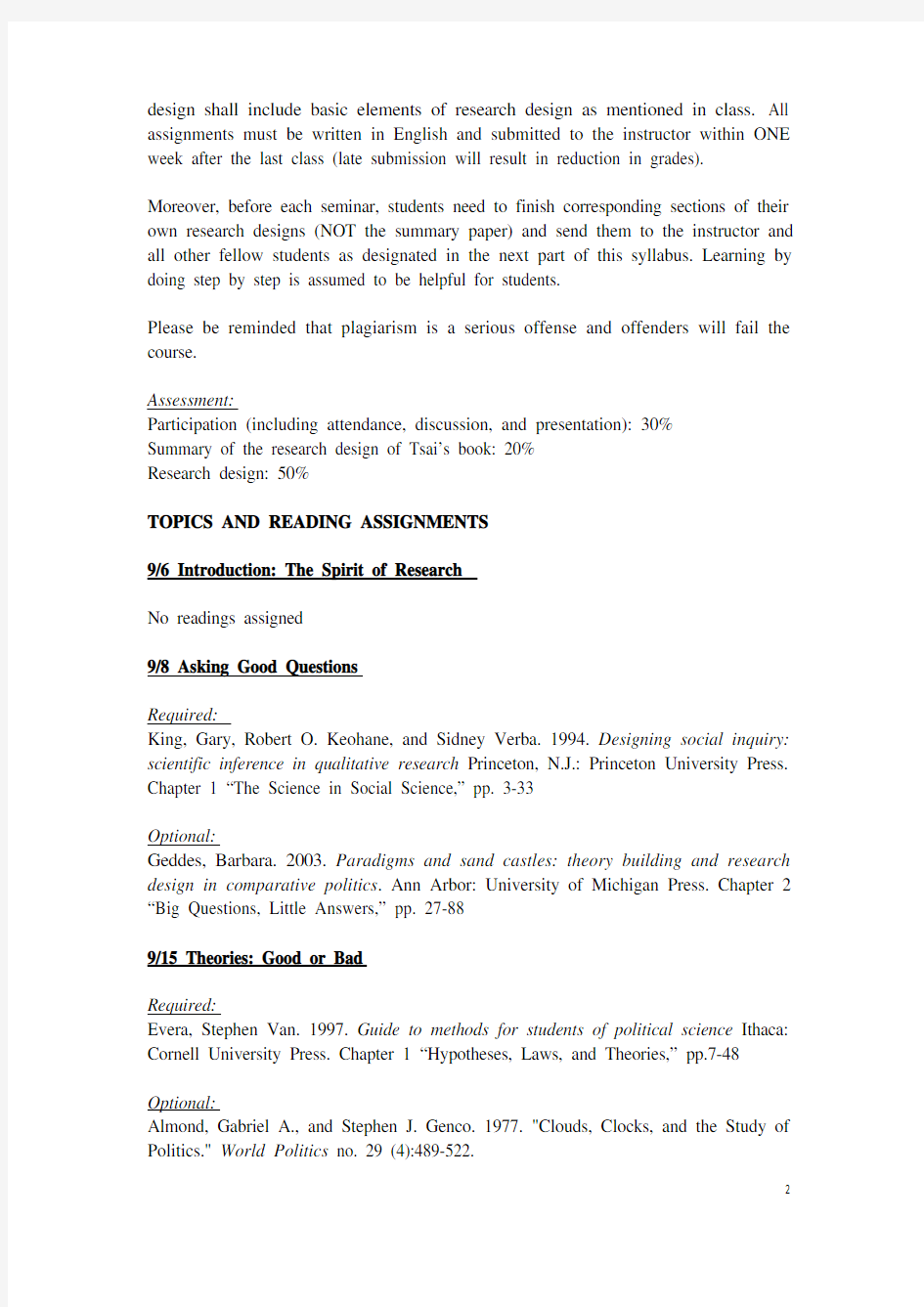Syllabus-Social_Science_Methodology


Social Science Methodology: Principles and Practices
2011-2012 First Semester
Odd-numbered Tuesday, 8:00-9:40 am; Thursday, 8:00-9:40 am
Rm. 203, Upper Hall (上院), Minhang Campus
Instructor: CHEN Huirong Office Hours: Tuesday (3-5p.m) Email: sjtuchenhuirong@https://www.360docs.net/doc/c56109468.html, and by appointment
Address:
COURSE DESCRIPTION
This course is about spirit and craft of social science research. Mainly as knowledge consumers, undergraduate students need to identify good research and bad research. They can also produce some new findings in political science. For these purposes, the instructor hopes to help students think like social scientists. Students are expected to understand general procedures, fundamental principles, and diverse methods of doing empirical research, know basic elements of a research design, and learn to design a small research project and deal with methodological issues with the assistance of the instructor and fellow students.
The course will cover concrete issues of conducting research: framing questions, developing theories, choosing appropriate research design (large-N or small-N) and methods (statistical, experimental, or case study), conceptualization and measurement issues, and engaging sources, etc.
This course combines lectures with seminars. Lectures allow the instructor to introduce basic knowledge of social science methodology while seminars encourage more class participation and discussion.
REQUIREMENTS AND ASSESSMENT
Readings and participation
Students have to read REQUIRED readings before class and actively participate in discussion. They are encouraged to read optional readings.
Written assignments:
There are two assignments. First, students need to summarize the research design of Lily Tsai’ book (Tsai, Lily L. 2007. Accountability without Democracy: Solidary Groups and Public Goods Provision in Rural China Cambridge: Cambridge University Press) and the page limit of summary paper (1.5 spaced) is no less than 10 pages. Second, students are required to design a small research project. The research design shall be no less than 15 pages long (1.5 spaced). Both summary and research
design shall include basic elements of research design as mentioned in class. All assignments must be written in English and submitted to the instructor within ONE week after the last class (late submission will result in reduction in grades).
Moreover, before each seminar, students need to finish corresponding sections of their own research designs (NOT the summary paper) and send them to the instructor and all other fellow students as designated in the next part of this syllabus. Learning by doing step by step is assumed to be helpful for students.
Please be reminded that plagiarism is a serious offense and offenders will fail the course.
Assessment:
Participation (including attendance, discussion, and presentation): 30%
Summary of the research design of Tsai’s book: 20%
Research design: 50%
TOPICS AND READING ASSIGNMENTS
9/6 Introduction: The Spirit of Research
No readings assigned
9/8 Asking Good Questions
Required:
King, Gary, Robert O. Keohane, and Sidney Verba. 1994. Designing social inquiry: scientific inference in qualitative research Princeton, N.J.: Princeton University Press. Chapter 1 “The Science in Social Science,” pp. 3-33
Optional:
Geddes, Barbara. 2003. Paradigms and sand castles: theory building and research design in comparative politics. Ann Arbor: University of Michigan Press. Chapter 2 “Big Questions, Little Answers,” pp. 27-88
9/15 Theories: Good or Bad
Required:
Evera, Stephen Van. 1997. Guide to methods for students of political science Ithaca: Cornell University Press. Chapter 1 “Hypotheses, Laws, and Theories,” pp.7-48 Optional:
Almond, Gabriel A., and Stephen J. Genco. 1977. "Clouds, Clocks, and the Study of Politics." World Politics no. 29 (4):489-522.
Waltz, Kenneth N. 1979. Theory of international politics New York: Addison-Wesley Pub. Co. Chapter 1 “Laws and Theories,” pp.1-17
9/20 Seminar
Help students improve their research questions. Students have to send their research questions to the instructor and all other fellow students by 9/18.
9/22 Conceptualization
Required:
Gerring, John. 2001. Social science methodology: a criterial framework Cambridge: Cambridge University Press. Chapter 3 “Concepts,” pp.35-64
Optional:
Sartori, Giovanni. 1970. "Concept Misinformation in Comparative Politics." American Political Science Review no. 64 (6):1033-53.
9/29 Descriptive Inference: Generalization and Classification
Required:
King, Gary, Robert O. Keohane, and Sidney Verba. 1994. Designing social inquiry: scientific inference in qualitative research Princeton, N.J.: Princeton University Press. Chapter 2 “Descriptive Inference,” pp.34-74
Optional:
Gerring, John. 2001. Social science methodology: a criterial framework Cambridge: Cambridge University Press. Chapter 6 “Description and Prediction,” pp.118-27
10/4 Seminar
Help students improve their theories. Students have to develop their arguments (theories) and submit them to the instructor and all other fellow students by 10/2.
10/6 Causal Inference: Overview
Required:
King, Gary, Robert O. Keohane, and Sidney Verba. 1994. Designing social inquiry: scientific inference in qualitative research Princeton, N.J.: Princeton University Press. Chapter 3 “Causality and Causal Inference,” pp. 75-114
Optional:
Gerring, John. 2001. Social science methodology: a criterial framework Cambridge:
Cambridge University Press. Chapter 7 “Causation,” pp. 128-54
10/13 Causal Inference: Discussion
Required:
Rogowski, Ronald. 2004. "How inference in the social (but not the physical) sciences neglects theoretical anomaly" In Rethinking social inquiry: diverse tools, shared standards edited by Henry E. Brady and David Collier, 75-84. Lanham: Rowman & Littlefield.
Optional:
Elster, Jon. 2007. Explaining social behavior: more nuts and bolts for the social sciences Cambridge; New York: Cambridge University Press. Chapter 2 “Mechanism,” pp. 32-51
10/18 Seminar
Help students refine their causations. Students are required to submit their revised arguments to the instructor and all other fellow students by 10/16.
10/20 Research Design: General Criteria
Required:
Gerring, John. 2001. Social science methodology: a criterial framework Cambridge: Cambridge University Press. Chapter 8 “Research Design,” pp. 155-99
Optional:
Schmitter, Philippe. 2008. "The design of social and political research." In Approaches and Methodologies in the Social Sciences: A Pluralist Perspective, edited by Donatella della Porta and Michael Keating, 263-95. Cambridge: Cambridge University Press.
10/27 Research Design: Large-N or Small-N
Required:
Gerring, John. 2007. Case study research: principles and practices Cambridge ; New York Cambridge University Press. Chapter 3 “What Is a Case Study Good For?” pp. 37-64
Optional:
Creswell, John W., and Vicki L. Plano Clark. 2006. Designing and Conducting Mixed Methods Research. London: Sage Publications. Chapter 4 “Choosing a Mixed Methods Design,” pp. 58-88
11/1 Seminar
Help students improve their research designs. Students need to submit their research designs to the instructor and all other fellow students by 10/30.
11/3 Research Methods: Experimental and Statistical
Required:
Gerring, John. 2001. Social science methodology: a criterial framework Cambridge: Cambridge University Press. Chapter 9 “Methods,” pp. 200-229
Optional:
Kidder, Louise H., Charles M. Judd, and Eliot R. Smith. 1986. Research methods in social relations 5th ed. New York Holt, Rinehart and Winston. Chapter 4 “Randomized Experiments,” pp. 69-101
Shively, W. Phillips. 2008. The craft of political research 7th ed. Upper Saddle River, N.J.: Prentice Hall. Chapters 8, 9, 10 “Introduction to Statistics,” pp. 111-65
11/10 Research Methods: Case Studies
Required:
Gerring, John. 2007. Case study research: principles and practices Cambridge; New York Cambridge University Press. Chapter 6 “Internal Validity,” pp. 151-71 Optional:
Gerring, John. 2007. Case study research: principles and practices Cambridge; New York Cambridge University Press. Chapter 5 “Techniques for Choosing Cases,” pp. 86-150
11/15 Seminar
Help students improve their specific research methods. Students are required to submit their research method sections to the instructor and all other fellow students by 11/13.
11/17 Selection of Observations and Selection Biases
Required:
King, Gary, Robert O. Keohane, and Sidney Verba. 1994. Designing social inquiry: scientific inference in qualitative research Princeton, N.J.: Princeton University Press. Chapter 4 “Determining What to Observe,” 115-49
Optional:
Collier, David, James Mahoney, and Jason Seawright. 2004. "Claiming Too Much: Warnings about Selection Bias." In Rethinking Social Inquiry: Diverse tools, Shared Standards, edited by Henry E. Brady and David Collier, 85-102. Lanham: Rowman & Littlefield.
Collier, David, and James Mahoney. 1996. "Insights and Pitfalls: Selection Bias in Qualitative Research." World Politics no. 40 (1):56-91.
11/24 Measurement
Required:
Shively, W. Phillips. 2008. The craft of political research 7th ed. Upper Saddle River, N.J.: Prentice Hall. Chapters 4 and 5 “Problems of Measurement,” pp.41-73 Optional:
King, Gary, Robert O. Keohane, and Sidney Verba. 1994. Designing social inquiry : scientific inference in qualitative research Princeton, N.J.: Princeton University Press. Chapter 5 “Understanding What to Avoid,” pp. 151-67
11/29 Seminar
Help students improve their case selections and measurements. Students are required to submit their methods of case selection and measurement to the instructor and all other fellow students by 11/27.
12/1 Engaging Sources: Survey
Required:
Kidder, Louise H., Charles M. Judd, and Eliot R. Smith. 1986. Research methods in social relations 5th ed. New York Holt, Rinehart and Winston. Chapter 11 “Questionnaires and Interviews,” pp. 219-35
Optional:
Kidder, Louise H., Charles M. Judd, and Eliot R. Smith. 1986. Research methods in social relations 5th ed. New York Holt, Rinehart and Winston. Chapter 7 “An Introduction to Sampling,” 143-67;
Tang, Wenfang. 2005. Public opinion and political change in China Stanford, Calif.: Stanford University Press. Chapter 2 “Collecting Public Opinion in China,” pp. 33-54
12/8 Engaging Sources: Interviews and Archives
Required:
O'Brien, Kevin J. 2006. "Discovery, Research (Re) design, and Theory Building." In Doing Fieldwork in China edited by Maria Heimer and Stig Thogersen, 27-41. Copenhagen: NIAS.
Optional:
Solinger, Dorothy J. 2006. "Interviewing Chinese People: From High-level Officials to the Unemployed." In Doing Fieldwork in China edited by Maria Heimer and Stig Thogersen, 153-67. Copenhagen: NIAS.
Thogersen, Stig. 2006. "Approaching the Field through Written Sources." In Doing Fieldwork in China edited by Maria Heimer and Stig Thogersen. Copenhagen: NIAS. 12/13 Seminar
Help students improve their methods of data collection. Students are required to submit their methods of engaging sources to the instructor and all other fellow students by 12/11.
12/15 Varying Approaches to Social Inquiry
Required:
della Porta, Donatella, and Michael Keating. 2008. "How many approaches in the social sciences? An epistemological introduction." In Approaches and Methodologies in the Social Sciences: A Pluralist Perspective, edited by Donatella della Porta and Michael Keating, 19-39. Cambridge: Cambridge University Press.
Students present their research designs
12/22 Conclusion: The Craft of Research
Required:
Snyder, Richard. 2007. "The Human Dimension of Comparative Research." In Passion, craft, and method in comparative politics, edited by Gerardo L. Munck and Richard Snyder, 1-31. Baltimore, Maryland: The Johns Hopkins University Press. Students present their research designs
